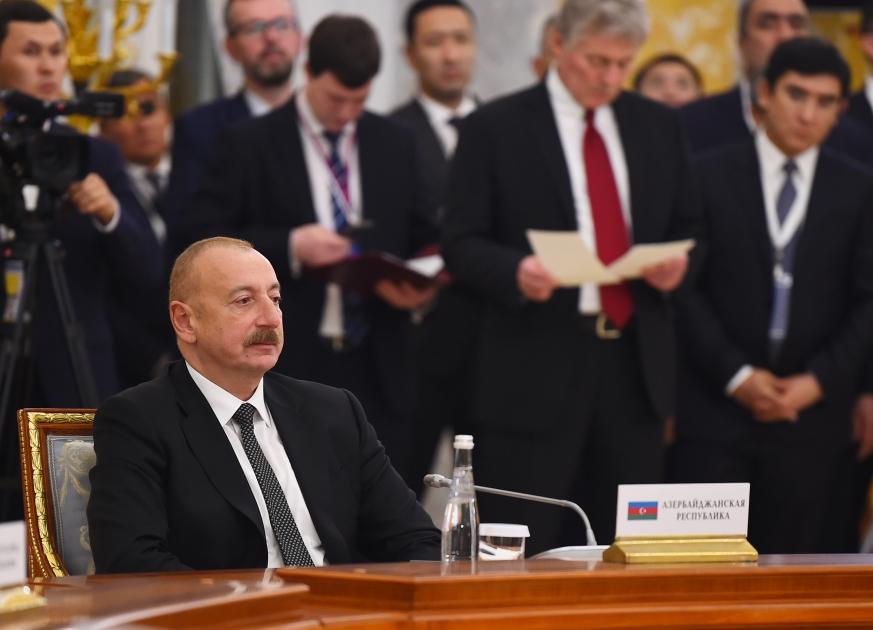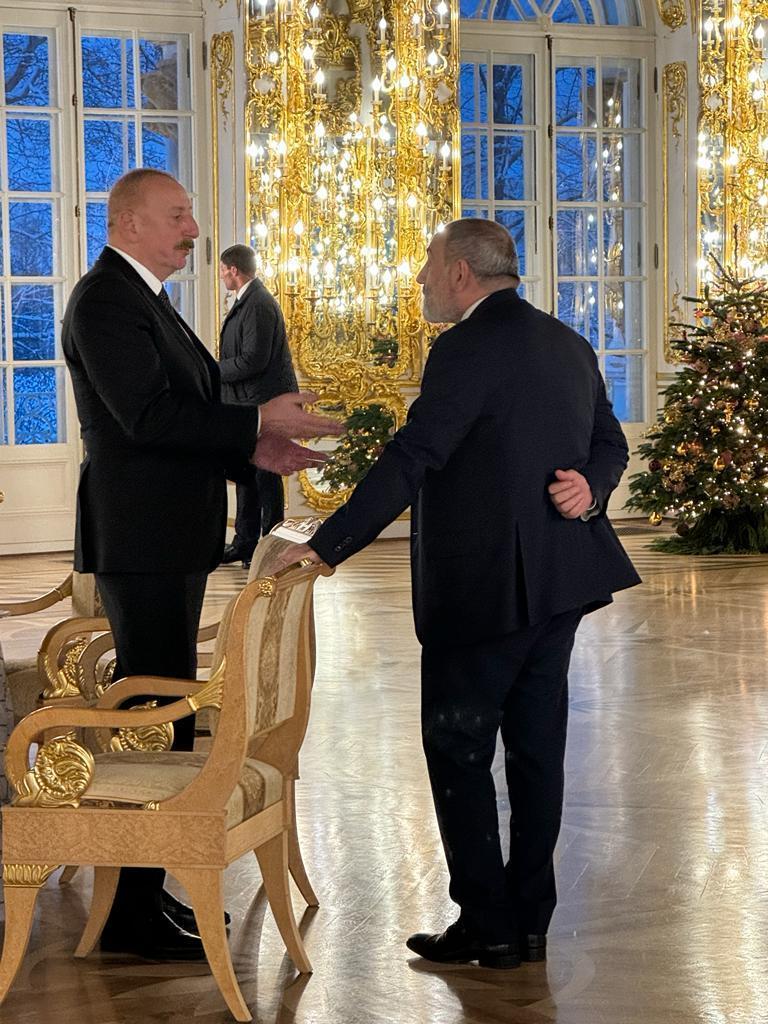Baku calm and collected as Armenia-Russia "cold war" goes on Pashinyan faces a delusional choice
This week has proved to be eventful. Armenian Prime Minister Nikol Pashinyan, having endured and perhaps overdone a dramatic pause, came to St Petersburg. On December 25, he took part in the summit of the Eurasian Economic Union. The following day, he joined an informal meeting of CIS heads of state attended by Azerbaijani President Ilham Aliyev. Pashinyan was sullenly listening to a tour guide's description of the Pavlovsk palace's exhibits when Aliyev entered the room, bringing considerable excitement to the protocol action. They greeted each other politely. Aliyev was reserved but cordial. Pashinyan remained sullen. Sullen is perhaps the key word to describe Pashinyan's mood in Russia's northern capital.
At the EAEU summit, however, Pashinyan was more relaxed, which is explained on the one hand by Ilham Aliyev's absence (Azerbaijan is not a member of the EAEU - ed.) and on the other by his direct interest in Eurasian economic integration. As it is known, a significant part of the sub-sanctioned goods is exported to Russia via Armenia, which has boosted the growth of trade between the two countries by 45 per cent in comparison with the figures of the previous year. The agreement on free trade between the EAEU and Iran reached at the summit is another factor. Armenia, as the only member of the Union bordering Iran, has benefited from this agreement and naturally, it takes an active stance on related issues.
Pashinyan boldly declared that "economic principles should not correlate with political ambitions", as if aware of his growing weight in foreign trade with Russia and in contrast to Putin's active promotion of full integration in the Eurasian space. According to him, the EAEU is an economic association "that should have no political, let alone geopolitical agenda".
Thus, Pashinyan is trying to maximise the benefits of economic cooperation while distancing himself as much as possible from military and political cooperation, including Russia's mediation in the peace settlement between Armenia and Azerbaijan. First of all, as has been mentioned many times, Yerevan is unhappy with Moscow's insistence on complying with Point 9 of the Trilateral Statement and, as a consequence, Moscow's control over the Zangezur corridor.
At the same time, the fact that Pashinyan came to St Petersburg shows that it is increasingly difficult for him to play a double game (the West and Russia), with each side demanding a choice. No wonder that, almost simultaneously with the events in St Petersburg, NATO's special representative for the Caucasus and Central Asia, Javier Colomina, sent out either a promise or a caution, disguised as a bold statement of fact: "Armenia has very clearly decided to change its foreign policy and to distance itself from Moscow. This is something that we are encouraging. The Armenians are free to make their own decisions. Still, they have decided to do so, and I think that they are already beginning to come closer to us - asking for more cooperation, asking for more political dialogue, asking for more of a NATO presence. We support all the decisions of our partners that we think are good for the stability of the region. That is very important to us".
But are NATO's warnings and promises of any value? Yes, Kolomina promised mountains and marvels. But I think we have already seen and heard that somewhere. In Georgia and Ukraine, of course.
The Armenian elite now seems to be coming to realise two things. First, Russia has been able to contain the Ukrainian counter-offensive and is better prepared for a long war. And two, both the US and Europe are becoming more open about the fact that they do not intend to support Ukraine adequately. Under these circumstances, Pashinyan, who until recently had been actively ignoring the summits with Russia, has been rushing to put out the flames of the bridges that have already been set on fire. What is the reason for Pashinyan's tension? Perhaps he now realises that the most foolish and hasty move in the pivot away from Moscow was the ratification of the Rome Statute, which was actually a personal insult to Putin. Pashinyan's behaviour when he was approached by Putin during the aforementioned trip to Pavlovsk is very characteristic. Pashinyan recoiled from the Russian leader with fear in his eyes. He is afraid of him. Therefore, Pashinyan's uneasiness has less to do with the choice between the West and Russia than with the question of what he will do if he opts for Russia.

Unofficial contacts between the Prime Minister of Armenia and the President of Azerbaijan were held during the unofficial CIS summit. "Issues related to the peace agenda between Armenia and Azerbaijan were discussed. The talks were held in a bilateral format," the Armenian Prime Minister's spokeswoman Nazeli Baghdasaryan announced in response to a journalist's question. It is important to note that the meeting was held on the sidelines.
Despite Moscow's obvious jealousy of direct bilateral talks between Baku and Yerevan, Putin carefully left the two leaders alone. At the same time, Russian presidential spokesman Dmitry Peskov rushed to announce his participation in the talks: "They (the leaders of Azerbaijan and Armenia - ed.) declare their full readiness to conclude the peace talks, to reach a single document, a peace treaty," Peskov said in an interview with Channel One on the sidelines of the St Petersburg meeting, boldly suggesting that Moscow would be involved in the signing of the peace treaty in one way or another. This is perhaps the loudest of all the bids for future "authorship" of the treaty. What distinguishes it from the Washington and European offers is its more confident tone and the fact that it was made while both leaders were in St Petersburg. Russia managed to host both leaders, while the West failed to do so after Azerbaijan's successful anti-terrorism measures in September.
Pashinyan seems aware that if peace is not signed according to Moscow's plan, it will still find ways to torpedo the Zangezur corridor outside the framework of the Trilateral Statement (i.e. under Yerevan's control). Baku, on the other hand, shows little interest in this issue. In a way, Moscow's plan is even more favourable for it, because in this case, we will have two ways to Nakhchivan and Türkiye - through Iran and Armenia. Therefore, it seems to me that Baku is carefully waiting to see how, or rather when, the duel between Moscow and Yerevan will end.

Baku has solved all its problems and is ready to sign the peace treaty. Yerevan is still waiting for something. The media have circulated a photo of Aliyev and Pashinyan discussing something while standing. Aliyev held out his palms with the inner part facing upwards, a gesture of complete openness and transparency, while Pashinyan put one hand behind his back, revealing his hidden intentions. How far have Pashinyan's hidden intentions gone? The question is rhetorical.
It looks as if Baku has played a game of jewels, moving and at the same time forcing different players to move the gems in such a way that the last one remains to be moved to the only empty space. And regardless of the gem's wishes, it will be moved there.








